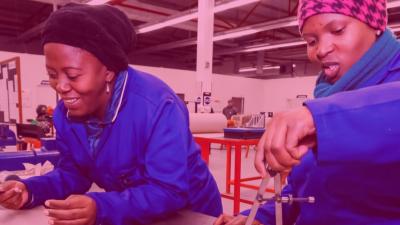
Engineering X grants £1mil to improve engineering education
Engineering X gives £1 million worth of grants to projects across 14 countries to boost the quality of engineering education and training.
This page is approximately a 3 minute read
This page was published on

Students funded by a scholarship programme we’re supporting are learning the skills they need to deliver change in some of Africa’s developing economies. The University of Manchester’s Equity and Merit Scholarships aim to advance education in engineering and technological disciplines for talented graduates from the Global South. By empowering scholars with vital knowledge, skills and confidence, the scheme equips them play a critical role in meeting their home countries’ most pressing infrastructure needs.
Two of 2019’s intake received full funding for their master’s programmes as Lloyd’s Register Foundation Equity and Merit Scholars.
Joanne Jacobs, Senior International Officer from The University of Manchester, explained the impact of the grant: “The Lloyd’s Register Foundation grant provides full funding for talented young engineers from the global south to further their studies at The University of Manchester. In doing so, the grant is providing a vital boost to their home countries’ developing infrastructures.”
The programme aims to advance education in engineering and technological disciplines for talented graduates from Uganda, Rwanda, Tanzania, Ethiopia, Zimbabwe and Malawi.
The scholarships empower talented engineers with the knowledge and practice to play a critical role in the future of their countries. They are equipped to drive change and development, aligned with the Foundation’s objectives of promoting safety of life, property and the environment.
One of 2019’s scholars, Prossie Arinaitwe from Uganda, studied for an MSc in Electrical Power Systems Engineering and explains what the funding enabled her to study:
“I have been able to recap the major theoretical concepts and calculations used in electrical engineering, which has helped to create a level playing field between students like me, who have been out of academic study for a long time, and those who have just graduated.
“I then moved onto studying modules which covered the trading of electricity to enable the economic growth of a nation, while maintaining a reliable power supply for the network, and using electronics to control the power system and other engineering systems.”
Grace Ingabire, an MSc Management of Projects (Construction) student from Rwanda, said: “Adapting to the UK’s system of teaching and learning was an uphill task for me in the first semester; I have since grown tremendously in my critical thinking and analytical writing abilities.
“Despite the current challenges of dealing with the effects of COVID-19, including the temporary shutdown of some university services, I have progressed well with the use of the new online system of teaching. I completed an advanced research project in the summer of 2020.”
The pandemic has further highlighted the vital importance of infrastructure in improving public safety and wellbeing in East African countries.
Engineering will be critical to meeting the need for improved access to suitable shelter, clean water, sanitation and energy in the region’s cities and settlements. However a lack of high-quality education has led to low local skills levels, particularly in science and engineering, severely hampering the provision of critical infrastructure to achieve sustainable development. Bursaries and scholarships are a much needed part of addressing this.